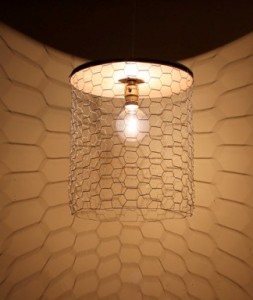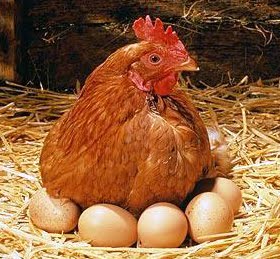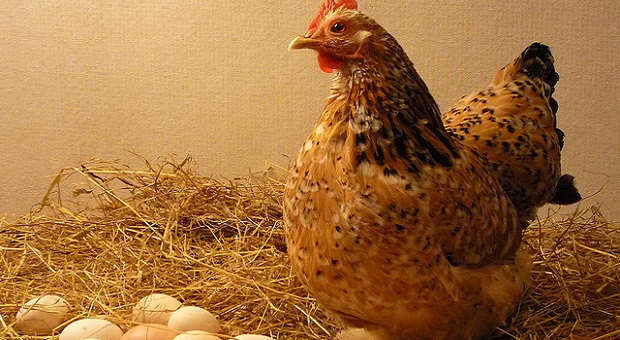Chickens are a bit fickle about cold weather, but the last thing that you want them to do is stop laying eggs. In a survival situation, that could be catastrophic. Fortunately, with just a few modifications, you can keep those hens clucking right along no matter how cold it gets!
If your chickens have already stopped laying eggs, don’t worry – it’s fixable and luckily you’re learning these tips now instead of in a SHTF situation that makes eggs crucial to survival. If you’re still getting eggs but would like to increase your production, following these tips will help.
Let’s get crackin’.
Why Do Chickens Stop Laying in Winter?
In order to understand why your chickens stop laying eggs in the winter, you need to remember why they lay eggs to begin with. Regardless of how it may seem, it’s not so that you can have omelets and bake cakes! Chickens lay eggs to reproduce and in the winter, the chicken’s body, specifically its endocrine system, shuts down egg production because winter isn’t the ideal time for chicks to be born.
Shed Some Light on Your Chickens

In a SHTF scenario, this may not be feasible, but it’s the best way to boost egg production and keep your egg factories from shutting down.
Use common sense if you decide to install lights. They are fire hazards so keep them where your chickens can’t knock them over.
Also, you only need to add a couple of hours to the day, though you can leave them on 24/7 for light and heat if you’d like. At the minimum, make sure that they’re getting 14 hours of light per day. When you add those few hours isn’t nearly as important as just doing it, though many people prefer to add it in the morning.
Weird fact: Red light seems to reduce cannibalism and pecking and have a calming effect on chickens.
Increase Protein
Chickens need plenty of protein in order to lay regularly. In the winter, they burn more calories trying to stay warm so they need more food just to survive.
If you notice a drop in production, add in some soybeans, wheat, corn, oats, sunflower seeds, alfalfa, or your protein of choice.
Keep Your Chickens Warm and Toasty
Chickens don’t deal well with drafts or dampness so sealing your coop up so that it’s warm and dry will help boost egg production, or keep them from quitting on you.
Also, building the coop up off the ground will keep it drier, too.
Keep Them Feeling Safe and Healthy
Stressed chickens don’t lay eggs. If you have predators coming and going in the coop, lots of noise outside of the coop or other stressors that disturb your chickens, you’re not going to get eggs.
Cold is also a stressor so keeping your coop warm is important.
In the winter, predators are looking for warm places to hide, too. If you happen to be offering chicken nuggets as well as a warm place, your coop is going to be a hit. Secure it so that nothing can get in.
Finally, lice and other pests can irritate your chickens and even cause disease. This, of course, causes stress. Keep them bug-free and healthy.
Plan for Molting

The molting process takes anywhere from 2-6 weeks. They’re probably not going to lay eggs while they’re molting so unless you just want to go that long without eggs, buy your chicks in batches so that they are a few months apart in age and won’t be molting at all once. Your overall production will still drop but at least you’ll still be getting eggs through the winter.
Keeping your chickens laying eggs through the winter requires a bit of finessing and tweaking the system but it can be done. The most important thing to remember is, as always, keep them happy because happy chickens lay eggs!
Find out more about food independence in Pocket Farm.
This article has been written by Theresa Crouse for Survivopedia.









Linda | January 3, 2014
|
I have heard that keeping the chicken’s feet warm is the key to good egg production. Apparently, you can make a mix of cayenne and water and paint it on the bars where they roost at night. This will heat things up and trick their little brains. I’ve never tried it but feel it was worth mentioning.
…-~*~…
Bobby simmons | December 11, 2016
|
If you are using metal roosts they should be covered and or padded this prevents their feet from freezing and helps them grip the roost
David fisher | January 6, 2014
|
Good information here. It’s been over 40 years since I had chickens but I do remember most of your tips. If you have an organic mulch bin that you add coffee grounds, eggshells and other bio byproducts, you can dig in there and harvest the worms for more protein. Your chicks will love you baby!
Tim | January 6, 2014
|
I have a 8×10′ coup that is sealed and insulated. I currently have 6 chickens in there with two heat lamps, an LED bulb with a timer, and a battery heater (flat kind) sandwiched between some patio blocks/bricks for passive heat. Works great. It was -14 yesterday and the coup was 42. The battery heater is the best one because it only uses 18 watts and heats the bricks up, but won’t start a fire. Got that tip from a guy from Alaska who uses three of them to heat his entire coup.
Aunt Jane | January 18, 2014
|
could use info on battery heater. Where do I get one?
Pastor Jim | January 23, 2014
|
Found mine at O’Reilly’s for $30. No thermostatic control, just a plain heating pad. (Part # 22400A)
Uses 60 watts (I’ve never seen one that was rated for 18 watts)
Aunt Jane | January 24, 2014
|
O’Reilly’s Auto Parts??
Brenda | January 6, 2014
|
We did everything suggested in this article last year and still egg production was way down. After doing some research, I found out that chickens also need Vit. D. Artificial light does not help them produce Vit. D. So I ground several Vit. D pills into a powder and mixed it with scraps. BOOM! Egg production went way up within a day or two! Now I supplement with Vit. D 2-3x a week and we are getting a dozen eggs a day instead of one or two.
Cat | January 6, 2014
|
In addition to vitamin D they will also need adequate calcium in their diet, to make the eggshells. Chickens, as all birds, have very little calcium reserves, so a calcium deficiency can be life-threatening.
Judy Hutchison | November 17, 2016
|
We use ground sea shells and finly ground limestone.
Works great as our “pets” eggs have the nicest shells.
Dorothy | January 7, 2014
|
How much (dosage & number of pills) per how many chickens? Mine have an outside pen but sure don’t want to be out in the cold!!
Albert D Friday jr, md | January 6, 2014
|
With the inclusion of the red light calming the birds, I want to add do not use red heat lamps like you see over roast beef at the cafeteria. These bulbs will “out gas” a type of teflon plastic that attacks the birds lungs. I raised exotic parrots for 15 years and rubbed elbows with a lot of smart “bird people”. A vet who works for the Houston, TX zoo shared with me that they lost a number of rare parrots one winter when the birds liked to roost next to these lights. The above was found coating their lungs at post (necropsy). Use instead the heat lamps that are ceramic and emit no light. Otherwise great points!
Donna Doores | January 6, 2014
|
Where do you buy these ceramic lights, what are they called??
Paul | December 2, 2015
|
You can buy them at pet stores, they’re popular with people who have lizards as pets. Just ask for a ceramic heat lamp, they usually screw into a standard light bulb socket.
Donna Doores | January 6, 2014
|
I have been thinking of having chickens, but live in Wasilla Alaska and gets pretty cold. I like the heater from bricks. And the vit. D2.
I have read that in the very cold climates, make the roosts from 1X3 so most of their feet are under them and not so many frozen toes. I haven’t tried it yet.
Appreciate any more info any one can pass on. Thanks, Donna
Everett R Littlefield | January 7, 2014
|
Been raising chickens for 60+ years and have found all the tips to be good ones. BUT if you have too many chickens in too small a space and seal it up tight to keep it warm, but have little to no cross ventilation, you will have a large buildup of carbon dioxide and ammonia which are both very detrimental to the health of your chickens!! Also, there being no place for the CO2 to go it condenses on the ceiling and walls and will rot out the roof in short order if left untended!
Pamela Allen | January 7, 2014
|
Due to disability and health reasons my idiot bantams are in a large cage here in the house. Because I’m by myself their coup and surround (fencing in everywhere a predator could squeeze in) isn’t done yet. I did have 2 pairs on the front porch in adequate cages and we were visited by a bear. A woman told me the only thing that would put bears off was fairly simple. Use the white blinking Christmas light strings. Even tho I still had yummy chickens out where he could get them he never came back (up onto the porch anyway). Other neighbors were visited however. Hey kids if you want nice lovely health filled eggs in the wintertime try actually buying them regular laying food from the feed store. You can ADD to this with scraps of dinner, veggies etc. They even love potatoes, raw or cooked. The worm thing for extra protein is a nice idea but you would have to have a heck of a lot of worms for even 6 hens. I’ve raised meal worms for my finches. They are quiet, not stinky, very economical and PROLIFIC!!! OMG! When I think of it I grab a handful and treat the hens. They love anything that moves. BTW in the early 1900’s mealworms were roasted or fried and were tasty snacks for people parties. I’m not ready to try it myself but the logic behind it is sound. Their life cycle is pretty basic .. the beetles lay these invisible eggs, the eggs hatch into the mealworm with 6 legs (you really can’t see them yet), they hang out, eat grow and you finally know they are in there when little bits of food move around. The grow generally to a bit more than an inch and then they get very sluggish, they turn into pupas? Stay that way for a bit and then turn into beetles. They eat oats, rice, birdseed, grits, corn and that sort of dry food. Bread is ok too if there isn’t much and it doesn’t get moldy. I supply them with bits of fruits and veggies when I make a salad. Not enough to get moldy tho. BTW I don’t give them just one type of food. I believe they each prefer a particular food and a variety will ensure health. I also throw in a handful of the chicken food (crumbles) Use this philosophy with your chickens too. Variety! I’ve always supplied them with the proper food but I let them have left overs generally stuff that is not meat. You should see them with spaghetti and sauce! Some folks think they can help supply their hens with the extra stuff it takes to build strong shells by drying and crushing used eggshells. I don’t recommend it. I’ve seen hens introduced to that “food” and they liked it so well they started stealing and eating their eggs before they could be gathered. I’ve never seen one to change back to normal after having yummy eggs. I advise the folks who are going to use artifical lights to scurry on out and buy them NOW. For winter (outside in Montana) I’ve always used regular 100watt lightbulbs in their coup. It provided heat and light. Economical enough to leave on 24/7. It is becoming almost impossible to find them. I’ve used the new fancy swuirrley ones that are supposed to last for years here in the house and had them blow after a couple weeks. Expensive and wasteful and potentially dangerous if broken. Trying to find any that will reproduce the amount of “lumens” that you get with the common 100watt is nearly impossible too. As we age we need more light. We need more light especially in the winter when it is grey outside. It is a safe and easy fix for the winter depression. Flip your inside lights on. Good luck with your chickens. My bantams (Japanese black tail duck wings) have it in their minds that NOW is the time to set on their eggs. Not a good habit to get into unless you have a perfect place in the winter to raise babies. Steal their eggs daily. Don’t start behaviiors that you cannot accomodate. Also if you have too many chickens in too small a space they will kill and eat each other. Feel free to post questions. One of us will have the answers.
Donna Doores | January 7, 2014
|
HI good info. I used to keep bantys, mostly to hatch eggs. They are such good moms. What was funny when I put 3 or 4 duck eggs under her. She had a fit when they went in the water. She scolded them good after they had their swim.
I love the little fluffy bantys. Mostly just for looks. I had one that ran around under the rabbit cages and one of the rabbits got out and kept chasing this little white fuzzy chicken around. I guess he thought it was a rabbit. I got them back in their own space. Sure didn’t want chick-a-rabs. : )
Take care of your self, Donna
The9th | January 8, 2014
|
Just a niggle from retired editor: We always used the spelling “coop” as in chicken coop. If you have government-fed assassinations, take-overs, 9/11s & other false flag attacks on the mind, and surviving the attempted military takeover of the US, then using “coup” would make lotsa sense, tho. (Out where there are co-operatives, shortened to “co-ops” or even “coops,” you can use the diaeresis to indicate the diff. between chicken coop and food coöp. (The ö is accessible from the keyboard and Special Characters> menu on Macs and from a special chars.’s menu on Windows, I think–been three decades since I last used Windox software.
Also, I’m in a suburban city outside of Boston (nextdoor to the first and thus far only city that the federal government has placed under martial law–Watertown, Mass.–without very much protest–so watch out for faked “attacks” that are used to frighten citizens into giving up their freedom) and wonder if you have to pass or repeal ordinances regarding the raising of chickens in your back yard. On the one hand, it does perhaps impact property values; on the other hand, a starving citizenry impacts EVERY value, among which are life, liberty and the pursuit of happiness, as the documents in the museum suggested was once the practice in the US. Our “representatives” at least paid them lip-service.
So while you’re breakfasting over those wonderful fresh egg omelettes, you might take the opportunity to peruse the US Constitution, from Preamble to the 27th Amendment. Quite an amazing document, if only our reps. didn’t perjure themselves in taking the oath to “support and defend” it, when they actually have no intention of doing so.
So don’t be chicken about demanding that We the People are the residuum of all US power, and that our “reps” are our employees in carrying out our instructions.
BTW, which chickens do you favor for flesh and which for eggs? Rhode Island Reds produce those nice “brown eggs” but what’s the best breed for meat? (free of pesticides from Chem-trails, antibiotics from Big Chicken Pharm-a, etc. I’ve found that as I age, my digestive tract is less tolerant of antibiotics. When my dad was my age, he thought he had some major intestinal disorder–turned out the problem went away after mom and he stuck exclusively with organically fed, chemical-free chickens–even without marigold petals.
fwiw.
Donna Doores | January 8, 2014
|
My Goodness, what a wonderful reminder of who we are and where we live.
Good info.
I agree with the rhode island chickens. Also the plymoth rocks are good layers. Not interested in the white legorens. How do you like my spelling? Maybe I’d better forget the chicken raising. I love the little banties, takes twice as many to get the same result for eggs. They are pretty good to let range in the garden and yard, they don’t scratch as deep and get just as many bugs.
Thanks for reply. Donna
pk allen | January 9, 2014
|
Coop it is. Couldn’t figure out why coup just didn’t look right. BTW in St.Petersburg Fla. They are allowed to keep 3 hens per household. No roosters..noise pollution. Buying mail order chicks is how I got started with my love affair with chickens. I very much recommend Murrey McMurrey. Not sure which chickens to get? Go for the surprise package and get quite a variety, even some that are rare.
Trent | January 13, 2014
|
My great-grandpaw used to waller out a shallow hole in the chicken park and fill it with feed and hot water. They laid eggs all winter. He didn’t have a heater or light in the coop it was too far away from the house. It works for us.
Donna Doores | January 13, 2014
|
HI thanks for info. What about doing this in Alaska? It would all freeze in a matter of minutes. Are there any solutions ?? thanks Donna
pk allen | January 13, 2014
|
Perhaps a large heated dog bowl or a crockpot set on warm with a timer attached would suffice for warmed food for chickens.
pk allen | January 13, 2014
|
Also to perk up egg laying I’ve used cheap dry cat food (soaked in water first). That is in addition to their normal food …not instead of their normal food. Birds in general will augment their protein intake by eating live things…and even dead things. Bugs, worms, lizards, frogs and more.
Donna Doores | January 13, 2014
|
I sure wouldn’t have thought of cat food. But sounds like common sense beings it is protein. I’ve had free range chickens years ago and I’m sure they ate things Ididn’t see. : ) Donna
Donna Doores | January 13, 2014
|
good idea thanks appreciate all tips. Donna
Practical Parsimony | January 26, 2014
|
My hens only have a Rubbermaid box to live in. They are inside a 10x10x6 foot dog pen with a tarp over it. The temps have been down to 8 F degrees and they are just fine. Chicken coops don’t need heat, insulation, or a tight fit. Those three things can kill a chicken. The condensation on the ceiling will drip and cause a damp coop, something that will kill them.
I have fed my hens chicken shells for their calcium intake. The oldest hen is five-years-old. She laid three eggs this last week in the cold weather. My mother, who lived through the Great Depression said they baked the shells before feeding them to hens or dogs. She did the same when I was a child. I do the same. Just put the eggshells, unwashed, into a pan (disposable pie pan works for me) and put the pan of eggshells into the oven after you take something out and turn the oven off. Don’t burn the eggs. Baking them changes the way eggs smell for dogs. I guess it does the same for hens. Mine have never had oyster and have very hard shells except for the occasional lapse in giving them eggshells. You can also put the eggs in the blender and mix the ground shells into any wet food for them. Otherwise, I just put the shells into a plastic bag and crush them into small pieces.
If you put light in on a timer, have the light come on before sunrise. If have it on at evening on a timer and the timer turns off before the chickens are on their roosts, they will have a hard time finding the roost in the sudden pitch dark.
Put Vaseline on comb and wattles to prevent damage from below freezing weather.
I made my own water heater from things around the house. You will probably not have the exact items, but you can get the general idea. Here is the link:
http://practical-parsimony.blogspot.com/2010/12/water-heater-for-hens-water-how-to-make.html
Charlene Gelletr | January 28, 2014
|
Thank you!
Meg scott | January 28, 2014
|
http://www.growingagreenerworld.com/winter-gardening/ great ideas in this episode on overwintering Chickens.
Pingback:Raise Chickens For Meat And Eggs | Survival skills, survival guns, survival guide | November 13, 2014
|
Pingback:How to Protect Your Farm Animals From Extreme Weather | Survival skills, survival guns, survival guide | November 17, 2014
|
Pingback:How To Slaughter And Clean A Chicken For Food | Survival skills, survival guns, survival guide | January 8, 2015
|
CHRISTINE GREEN | March 5, 2015
|
I HAVE A ROGUE BANTAM HEN WANDERED INTO THE YARD THIS SUMMER I LIVE ON LONG ISLAND NEW YORK I DONT HAVE A COOP PER SAY A STALL WITH A NESTING BOX . DURING THE WINTER BEFORE BLIZZARD I NCAUGHT HER AND BROUGHT IN THE HOUSE IN A WIRE DOG CRATE AT TOP OF BASEMENT STAIRS WHERE IT IS STILL COLD SHE SEEMED TO BE ALRIGHT FOR A FEW WEEKS I GAVE HER SOME PLASTIC EGGS SHE STARTED TO NEST ON THEM AND LAID EGGS FOR A WHILE BUT NOW SHE SEEMS DEPRESSED AND WONT WALK AT ALL I LET HER OUT AND SHE HAD BIG LOOSE STOOL SEEMS SHE DOESNOT WANT TO MESS IN THE CAGE NOW IN A FEW DAYS THE WEATHER WILL BREAK AND I CAN PUT HER OUT IN THE SMALL STALL REALLY DONT KNOW WHAT TO DO
Assinanine | September 10, 2016
|
You can stop writing in caps for one. The you can kill the bird.
Pingback:Why Chickens Stop Laying Eggs in the Winter - US Crisis PreppersUS Crisis Preppers | August 19, 2015
|
Pingback:Happy Hens Lay More Eggs: 8 Tips To Happy Hensdisasterdefense.usdisasterdefense.us | disasterdefense.us | August 21, 2015
|
Pingback:Happy Hens Lay More Eggs: 8 Tips to Happy Hens | Survival skills, survival guns, survival guide | August 21, 2015
|
Pingback:Happy Hens Lay More Eggs: 8 Tips To Happy Hens | TheSurvivalPlaceBlog | August 22, 2015
|
Pingback:9 Failed Apocalypse Predictions - On Your Step | October 2, 2015
|
Pingback:The Prepper’s Countdown Checklist to New Year’s Eve | Survival skills, survival guns, survival guide | December 1, 2015
|
Pingback:The Prepper’s Countdown Checklist to New Year’s Eve | Prepper's Survival Homestead | December 1, 2015
|
Pingback:The Prepper’s Countdown Checklist to New Year’s Evedisasterdefense.us | disasterdefense.us | December 1, 2015
|
Paul | December 2, 2015
|
Two great things to feed your chickens all year round but especially in the winter is plain whole fat yogurt (yes, chickens will eat yogurt with gusto), and sprouted wheat and barley grass. If they get to forage for weeds in warmer months then the sprouted grass isn’t as important, but in the winter it’s great for vitamins and also morale. And a bit of yogurt (especially homemade) every other day all year will give your birds extra fat, protein, vitamins, and calcium, which are all very important in winter. These things will also tend to shorten their molting cycle significantly and make their eggs (and meat) more nutritious.
Pingback:14 Cheap Ways To Feed Your Chickens | | disasterdefense.us | May 19, 2016
|
s ndlelo | June 29, 2016
|
Need that tapes of laying chicken end of September 31 hundred of them
Pingback:Diatomaceous Earth? Here's How To Use It For Your Homestead | Survivopedia | November 30, 2016
|
Pingback:Winter Survival: 5 Tips To Boost Your Dairy Cows | Survivopedia | December 13, 2016
|
Pingback:DIY Winter Water Heaters For Chicken Coop | Survivopedia | January 6, 2017
|
Pingback:Choosing Chickens for Eggs and Meat | Survivopedia | July 10, 2017
|